To celebrate the fiftieth anniversary of the longest-running science-fiction show in the world, I’ll be taking weekly looks at some of my own personal favourite stories and arcs, from the old and new series, with a view to encapsulating the sublime, the clever and the fiendishly odd of the BBC’s Doctor Who.
Battlefield originally aired in 1989.
Pitiful. Can this world do no better than you as their champion?
Probably. I just do the best I can.
– the Destroyer gets to know the Brigadier
Battlefield gets a bit of a bum rap as the weakest story in the final season of the classic Doctor Who. This isn’t entirely fair. Battlefield is a well-produced and thoughtful piece of Doctor Who, it just happens to be inferior to The Curse of Fenric, Ghost Light and Survival; it’s hardly the most damning indictment possible. After all, Battlefield would arguably be treated as an unsung gem had it aired during Colin Baker’s time on the show.
In keeping with Ben Aaronovitch’s last season opener, Remembrance of the Daleks, Battlefield is preoccupied with the history of the show – of its legacy and the artifacts that it carries with it. Archeology is a key theme here, but juxtaposed against a near future setting and the clever conceit of the Doctor manipulating his own history. There’s a wealth of great material here, even if the production never quite lives up to the potential teased.
Battlefield is a decidedly “timey wimey” story, with the past, present and future all exploding into the story at the same time. It’s a story set in the near future, using artifacts from the show’s history, featuring Arthurian knights carrying laser weapons and brandishing nuclear weapons. It’s a delightfully gonzo collection of iconography and imagery, and you can often feel Battlefield struggling to strike the right tone. “Laser-carrying knight hijack nuclear weapons in the near future” isn’t as evocative as “Daleks invade the sixties!”
More than that, though, there’s a sense of the show playing with its own history. The Doctor finds himself intervening in a situation that he began ages ago; only he hasn’t started it yet. The episode insinuates that the Doctor was and will be Merlin – a character with “a head of unruly red hair”, to quote the novelisation and adding some nice context to Tennant and Smith’s obsession with being “ginger.”
Here, we see the ultimate expression of the manipulative Cartmel era Doctor – a shrewd manipulator and schemer. Aaronovitch’s Remembrance of the Dalek introduced this characteristic, suggesting the Seventh Doctor was tidying up loose ends. It became one of the defining characteristics of this iteration of the character. Both The Greatest Show in the Galaxy and The Happiness Patrol suggest the Doctor is reacting to rumours and gossip. In The Curse of Fenric, he’s settling an old score.
Appropriately enough, Aaronovitch pushes this characterisation to its logical conclusion. In Battlefield, the Doctor winds up entrapping himself in one of his own grand schemes. “I could have given myself more warning,” the Doctor moans upon reading a note left by his future self, apparently frustrated at being used as a pawn even by himself, the arch-manipulator. (In a way, this seems almost a criticism of the Seventh Doctor’s manipulative scheming, reducing people to little more than pawns in an elaborate chess game.)
However, what’s striking about this is the idea that the Seventh Doctor isn’t following up on dangling plot threads from past unseen adventures. He’s not confronting the gods of ragnarok once again. Instead, the Seventh Doctor is being manipulated and controlled by his future self. This is an interesting choice, and one that is quite telling. For one thing, it assumes that the Doctor has a future. Which was far from certain in 1989. More than that, though, it suggests that Doctor Who is as beholden to its future as it is to its past.
Past and future mass together in Battlefield. Responding to a distress signal, Ace suggests, “Wherever it is it’s coming from, I don’t think we want to go there.” She’s talking about the future. The Doctor informs her it’s already past. “Too late. We’ve already arrived.” When Ace asks if the Doctor is Merlin, he responds, “No. But I could be, in the future. That is, my personal future. Which could be the past.”
Even Morgaine herself seems to bend time around her. Confronting the Brigadier, she vows, “But when we meet again, I shall kill you.” Of course, Jean Marsh killed Nicholas Courtney’s character in the First Doctor serial The Dalek’s Master Plan. Which is a story from the show’s past while being set in the future. Talk about your “timey wimey” stuff. Battlefield is really a story about the past of Doctor Who and how that relates to the future.
Battlefield is the first serial of the twenty-sixth season of Doctor Who. The show has just emerged from its quarter-century celebrations, as much as Resurrection of the Daleks and Silver Nemesis can be said to constitute a celebration. So it’s no coincidence that silver is a recurring motif in the episode, with silver serving as a weapon that confines and weakens (and ultimately destroys) the Destroyer. “With silver I shall bind you,” Morgaine vows.
In a way, the Destroyer serves as a cautionary tale for the show itself, a monster shackled with silver chains, weighed down by the legacy of twenty five years of history. It’s a story about modern Britain being invaded by Arthurian knights – the past manifesting in the present. While Battlefield draws in several classic concepts, it is careful to try to update them. Most obviously, Battlefield is a story dedicated to updating the core concept of U.N.I.T.
Again, this sort of speaks to how well the Cartmel era aligns with the vision of Russell T. Davies. Davies spent a great deal of time trying to figure out how to make U.N.I.T. work in the context of Doctor Who. His version of the show often felt quite uncomfortable with a bunch of armed military sidekicks for its pacifist scientist hero, and it’s telling that it took the Davies era four seasons to really get them working at all. Even then, The Sontaran Stratagem and The Poison Sky remains quite unsure of what to make of U.N.I.T.
(And the Davies era never quite commits to a heroic U.N.I.T. They are helpful in Planet of the Dead and Turn Left; but they’re also implicitly complicit with the “labour” camps in Turn Left and it’s portrayed as a good thing that Martha opted to part ways with the institution in The End of Time, Part II. Things get worse in Torchwood, where they’re revealed to play the part of jackbooted thugs Tosh’s tragic back story in Fragments and were seen to be part of the British government’s plans in Children of Earth. As you do. In contrast, Moffat made them a central part of the show’s fiftieth anniversary special, The Day of the Doctor.)
It’s quite clear that the Cartmel era shares many of the same concerns about U.N.I.T. There’s a sense that Aaronovitch is wondering why on Earth somebody like the Doctor would ever hang around with a bunch of military individuals, let alone actively help them blow stuff up. Tom Baker’s bohemian Doctor couldn’t wait to get away from his involvement with these soldiers, but McCoy’s Doctor is positively contemptuous of them.
“The military use the area as a firing range,” one character muses. “Never understood why.” The Doctor wryly responds, “Blowing the occasional chunk out of the earth keeps them amused.” Later on, he asserts, “Among all the varied wonders of the universe there’s nothing so firmly clamped shut as the military mind.” And yet, despite this, Aaronovitch hits on a strange conflict at the heart of the show’s nostalgia. For all the Doctor abhors guns and violence and military, he’s very fond of the Brigadier and Bessie. It’s hard to reconcile the two facets of the character.
Battlefield wrestles with the Doctor’s pacifism, making the point that there’s something a little bit hypocritical about a pacifist who hangs around with an armed battalion of troops at the ready. Somewhat foreshadowing the Davies’ era’s fascination with the true extent of the Doctor’s pacifism, Battlefield plays with the notion that the Doctor’s true pacifism is only possibly due to the people he hangs around with – Ace with her explosives and the Brigadier with his gun.
“It is a weakness, this lack of spirit,” Mordred bluntly states when the Doctor reveals that he would be unwilling to take a life even to save his companion. In a way, it’s a more intimate version of the crisis confronting the Ninth Doctor in The Parting of the Ways. When the Brigadier is willing to step up to take that moral compromise for him, the best the Doctor can do is offer a half-hearted plea. “Brigadier, this is not the way.”
It’s a rather nuanced way of looking at the Doctor’s pacifism, but it does delve into the complexities of pacifism as a moral philosophy – particularly for a character like the Doctor. This is ground that Davies would explore more thoroughly, but Cartmel and Aaronovitch draw attention to it in Battlefield. As much as the Doctor might be an idealist, he exists in a world with a great deal of complexity and shading.
Battlefield does offer a bit of a blueprint for how the show could resurrect U.N.I.T., if the urge grabbed them. There’s a lot of effort made to confirm the Doctor’s links to the military task force, albeit a long time ago. In a story about archeology, it’s telling that Bambera passes remarks upon the Doctor and Ace’s “pair of antiquated pass cards.” The Doctor affirms his identity by reciting continuity. “Yeti, Autons, Daleks. Cybermen and Silurians!”
And yet, despite this sense of familiarity, U.N.I.T. is a decidedly more modern operation. For the first time in the show’s history, there’s a decidedly progressive and international feel to the organisation. Most of the classic U.N.I.T. team tended to be white, British and male. Here, we have a variety of nationalities all serving under a woman of colour. The accents aren’t all British and middle-class. Supporting characters come from across the world.
In short, U.N.I.T. isn’t a standing army composed of British archetypes. It’s a genuinely progressive institution. There’s noen of the goofy and unprofessional comic relief, and U.N.I.T. seems more like an actual military operation than a bunch of friends hanging out together. Bambera is the future. She’s now the Brigadier, so much so that she reaffirms her title when Lethbridge-Stewart shows up. “I am the Brigadier!” she insists.
There’s also a sense that U.N.I.T. has a life outside of the Doctor. They no longer exist simply to carry his test tubes or fight his battles. This feels like an organisation that might be able to deal with its own problems every once in a while, rather than simply calling the Doctor back to Earth. Explaining arsenal of his disposal, the Brigadier reveals that U.N.I.T. hasn’t simply been sitting around and twiddling its thumbs as it waits for the Doctor to show up.
“U.N.I.T.’s been very busy, Doctor,” he informs his old friend. “We’ve also got high-explosive rounds for Yeti’s and very efficient armour-piercing rounds for robots. And we’ve even got gold-tipped bullets for you know what.” It’s nice to know that the world does more than simply sit around waiting for the Doctor to save it, and it’s a massive part of the evolution of U.N.I.T. to suggest that they can exist independently of the Doctor, something that Davies and Moffat each took a step further.
And then there’s the Brigadier. Battlefield is a surprisingly elegent farewell to a much-loved character. As disappointing as it was that Nicholas Courtney never got to appear on the revived live action show (instead guest-starring in The Sarah Jane Adventures), Battlefield really is the perfect place to leave him. It’s a story about the Brigadier’s own quiet and understated form of heroism, and one which suggests that Lethbridge-Stewart is only the larger-than-life figure of “the Brigadier” when the world needs him to be.
“The Brigadier” is what Lethbridge-Stewart becomes when he has to, and Battlefield manages to suggest both that the character will never properly retire, but also that he has an entire personal life safely tucked away from all his world-saving shennanigans. All of a sudden, the Brigadier isn’t a glorified soldier, but a man who does his job so that he may have a home to return to at at the end of the day.
The first episode teases the conflict between the Brigadier’s work and his family. Receiving the summons to battle, the Brigadier dutifully informs his love, “I still have my duty.” Doris bitterly responds, “This isn’t duty. You want to go. I mean, do I…? All this means so little to you.” You can see the conflict brewing, and almost predict the story beats. The Brigadier will never retire. He’ll die in the line of duty. He’ll make some grand sacrifice proving he’s the best man for the job, and do as a hero.
Except he doesn’t. He dismisses his own importance in facing down the Destroyer. He survives the episode’s climax. He returns home, and the Doctor cooks everybody dinner. Again, you can see the central ideas of the Davies era taking root – the Doctor “doing domestic”, so to speak. The sense that all these gigantic world-ending plots only matter because they disturb the Brigadier’s gardening habits and take him away from his loving wife and the business of growing old together.
This final season of the show is very much anchored on Earth, grounded in the familiar. It hops around in time a bit, but it’s very much about tying the sublime down among the mundane. This is partially a practical concern – it’s telling that Battlefield is the weakest story of the season; despite its epic scope, it’s the one where the budget is most obvious. However it’s also part of a conscious attempt to root the show back in the ordinary and the every day. So the Brigadier’s heroism is reinforced as an every day sort of heroism.
Which means that the epic is personal, and therefore the personal can become epic. It’s something reiterated a lot across the rest of the season, as Ace’s bad childhood memory becomes a universal epic in Ghost Light, before the show concludes with a struggle for the right to exist staged in Perivale in Survival. It’s an important part of the show’s evolution, and it’s certainly been a vital part of its history. Robert Holmes was very fond of juxtaposing these grand universal power struggles with the more intimate personal stakes. Battlefield just sees the Cartmel area firmly foregrounding that idea.
That idea, of course, ties rather nicely into the last grand theme of Battlefield – the blending of the real into the mythic. Battlefield effectively confirms something that Doctor Who has tended to shy away from during the Nathan Turner years. It suggests that Doctor Who is anchored as firmly in mystical fantasy as it is in anything approaching science. The show has toyed with the idea of Doctor Who as sheer fantasy before – arguably most noticeably in The Mind Robber, but also in stories like The Keeper of Traken.
However, Battlefield isn’t about arguing that Doctor Who is fantasy rather than science-fiction. It’s about arguing that it is both equally. This is, after all, a story about a mad man in a blue box that can take him anywhere at any time. He battles monsters and ghosts and demons. Doctor Who is firmly entrenched in the British tradition of fantasy literature that produced Alice in Wonderland or The Chronicles of Narnia.
So while the Doctor might talk about particles and artifacts and rays and radiation, he’s really just couching the story in pseudo-scientific terms. One of the great things that Davies did in the revival was to have the Doctor talk about the Time War using fantasy language rather than pseudo-techno-babble, producing evocative exposition involving “the jaws of the Nightmare Child” or “the Could’ve Been King” with his “Army of Meanwhiles and Neverweres.”
Here, Ben Aaronovitch suggests that the Doctor might as well be Merlin. When he objects to Ancelyn describing him as such, the knight rather efficiently lays down the Doctor’s iconography given a thin fantasy veneer, demonstrating how easily the show could be couched in the tradition of Arthurian myth. “No, not your aspect, but your manner that betrays you. Do you not ride the ship of time? Does it not deceive the senses being larger within than out?”
Indeed, when Ace and the Doctor encounter the ship at the bottom of the lake, Ace tries to understand it in purely scientific terms. “This is a spaceship?” she asks. “Who built it?” The Doctor explains, “It wasn’t built, it was grown.” While the Doctor explains that it is the work of “very advanced bio-engineers”, Ace continues, “Well, if they’re grown, how do they fly?” The Doctor responds, quite simply, “Magic.”
Again, given the subsequent confirmation in The Impossible Planet that TARDISes are grown rather than constructed, the conversation makes it clear that it’s as logical to suggest that the Doctor is powered by magic as by any laws of physics. It’s all the same. All that changes is the type of words you stitch together to form unconvincing exposition. The Doctor himself makes this clear to Ace in the same sequence.
“What is Clarke’s law?” he asks, citing the famous science-fiction writer. “Any advanced form of technology is indistinguishable from magic,” Ace dutifully answers. The Doctor, putting his logical hat on, suggests, “Well, the reverse is true.” Ace makes it explicit. “Any advanced form of magic is indistinguishable from technology.” The Doctor might be a Time Lord, but it’s just as valid to describe him as a refugee – or even (as in The Mind Robber) to hint that he’s a refugee from the world of stories. (And here, the suggestion that he is Merlin.) After all, this is a show about time travel.
This is a theme that gets carried over into Morgaine’s evil plot. When she tries to hijack a nuclear missile, she asks for “the secret incantation.” When Bambera plays dumb, she clarifies, “The magic words. The failsafe release code.” It’s all the same in the end, just different ways of describing the same thing – couching familiar ideas in more abstract terms. After all, isn’t that what a lot of allegorical science-fiction does anyway?
Battlefield sort of hits on that idea with the Destroyer, who is clearly intended to stand in for nuclear annihilation. Battlefield has an unfortunately dated Cold War aesthetic, but the Destroyer spends most of the episode chained and confined – a threat rather than a weapon. “This is no idle threat, Merlin,” Morgaine warns at one point. “Give me Excalibur or I will loose the Destroyer upon the world.” Even the character’s name (“the Destroyer”) can’t help but conjure up Oppenheimer’s reflections on that first nuclear test in 1945, thinking of a quote from the Bhagavad Gita. “I am become death, the destroyer of worlds.”
The Destroyer is such a grave threat that even those charged with his custody are wary of what he represents. “She fears me,” the Destroyer growls, of Morgaine. She denies it, but she spends the serial reluctant to deploy him. (She ultimately declines to use the nuclear missiles as well.) The Destroyer is pure destruction, nothing more. It exists only to tear down what has been built. He longs to be freed. “Let me claim this world,” the Destroyer pleads. When Ace asks what he wants with the world, the Destroyer responds, “Why, to devour it. What else?”
There are other nods towards the preoccupations of the Cartmel era. Class finds its way briefly into this story about magic knights and international military task forces. When Moldred confronts Ancelyn, he finds it hilarious that the knight has sought sanctuary far from the world of castles and lords. “Fitting that you should die amongst peasants,” he exclaims. It’s hardly enough to support a reading of Battlefield based on class, but it does demonstrate that the concerns played out across the Cartmel era.
Battlefield is the weakest episode of this final season. However, the fact that the weakest story of the season can be this well constructed is a testament to just how much work Andrew Cartmel and his writers had done to rehabilitate the series over the previous few years. It’s a shame that it wasn’t enough.
Filed under: Television | Tagged: Ace (Doctor Who), Auton, Battlefield, Ben Aaronovitch, Brigadier, Curse of Fenric, Dalek, doctor, DoctorWho, Happiness Patrol, jonpertwee, russell t. davies, second doctor, Seventh Doctor, Silurian (Doctor Who), Silver Nemesis, tardis, UNIT |
















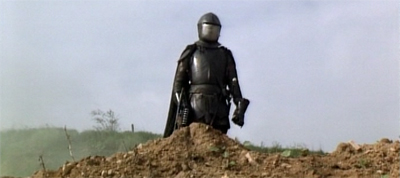


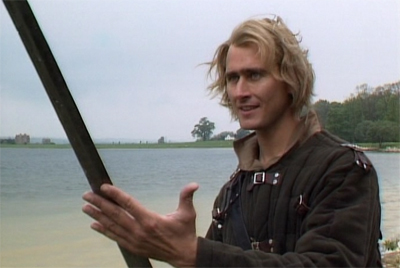







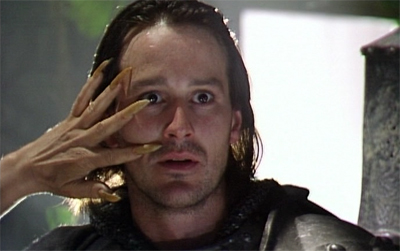



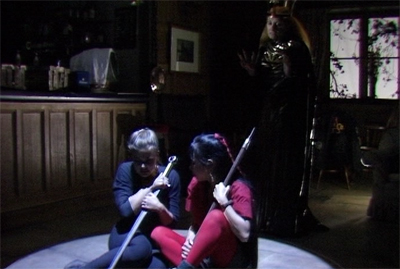


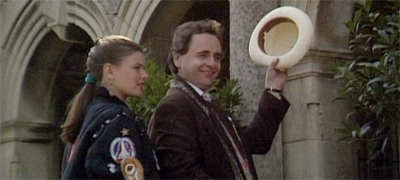





Leave a comment